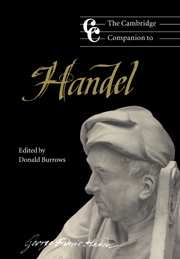Book contents
- Frontmatter
- Introduction
- Part I Background
- 1 Germany – education and apprenticeship
- 2 Italy – political andmusical contexts
- 3 Handel's London – political, social and intellectual contexts
- 4 Handel's London – the theatres
- 5 Handel's London – British musicians and London concert life
- 6 Handel's London – Italian musicians and librettists
- 7 Handel's English librettists
- Part II The music
- Part III The music in performance
- Bibliographical note
- Notes
- List of Handel's works
- Index
4 - Handel's London – the theatres
from Part I - Background
Published online by Cambridge University Press: 28 September 2011
- Frontmatter
- Introduction
- Part I Background
- 1 Germany – education and apprenticeship
- 2 Italy – political andmusical contexts
- 3 Handel's London – political, social and intellectual contexts
- 4 Handel's London – the theatres
- 5 Handel's London – British musicians and London concert life
- 6 Handel's London – Italian musicians and librettists
- 7 Handel's English librettists
- Part II The music
- Part III The music in performance
- Bibliographical note
- Notes
- List of Handel's works
- Index
Summary
Handel first came to London in his capacity as an opera composer, and that remained his primary occupation for more than twenty-five years. Consequently the ‘theatre system’ in London had a profound effect on the conditions in which he worked. The fledgeling opera company was far from stable when he arrived in 1710 and underwent several major revolutions in the course of Handel's life: confusing as these are, one must try to make sense of them if one is to understand Handel's often stormy career in the theatre.
London was (in theatrical terms) quite different from any other European city of its time. The multiple theatres that had flourished in Shakespeare's day had been abolished by the Puritans in 1642, and after Charles II was restored in 1660 he granted a pair of perpetual patents, creating a monopoly for two favoured courtiers. Neither Charles nor any of his successors could afford to create a court theatre or to patronise the arts on a lavish scale comparable to the promotion of masques by James I and Charles I before 1642. The London theatres were commercial enterprises dependent on daily ticket sales. The patent grants of the 1660s limited London to just two active theatre companies for more than fifty years: opera (or semi-opera, to be precise) was presented occasionally by the resident companies as part of their regular repertories. When Handel arrived, the patent theatres were Drury Lane (opened in 1674) and the Queen's Theatre in the Haymarket (opened in 1705).
- Type
- Chapter
- Information
- The Cambridge Companion to Handel , pp. 55 - 63Publisher: Cambridge University PressPrint publication year: 1997



